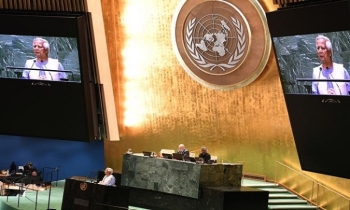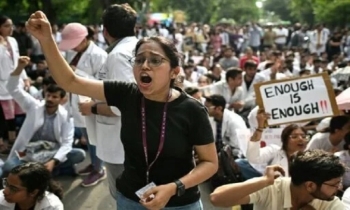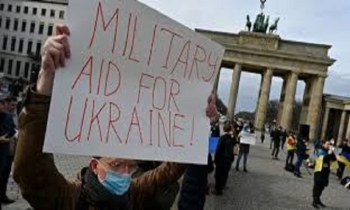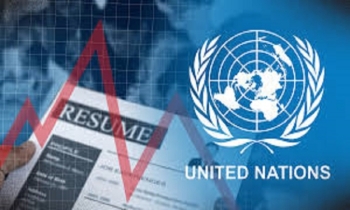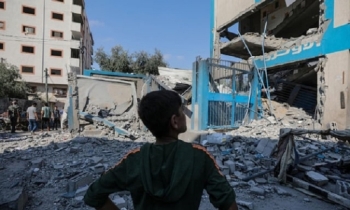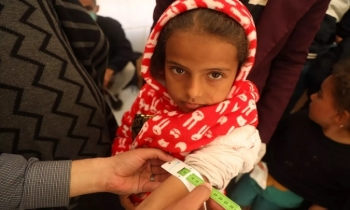COP26: Dickson says Bangladesh has particular role in 3 areas
UNB || BusinessInsider
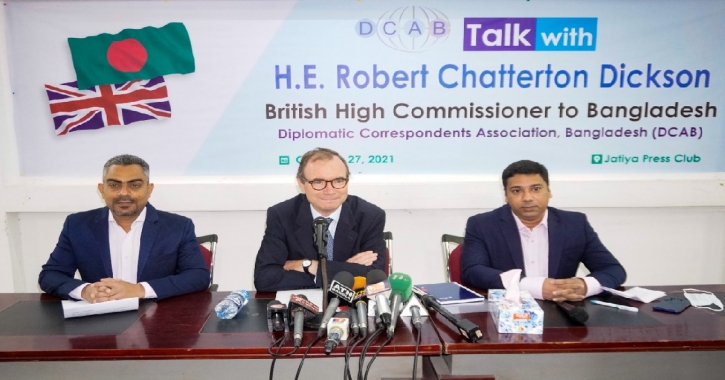
British High Commissioner to Bangladesh Robert Chatterton Dickson on Wednesday addressing a DECAB Talk in city on climate change.
British High Commissioner to Bangladesh Robert Chatterton Dickson on Wednesday emphasised the need for urgent climate action, pinpointing that there are three areas where Bangladesh has a particular role to play at COP26.
Mentioning that the world has a lot to learn from Bangladesh, he said this is the last opportunity to avoid dangerous climate change and secure a brighter future for everyone on the planet.
The UK will host the 26th UN Climate Change Conference of the Parties (COP26) in Glasgow on October 31- November 12.
While speaking at DCAB Talk, the High Commissioner said he would bid farewell to Prime Minister Sheikh Hasina on her departure for the UK for COP26 and other bilateral meetings.
DCAB (Diplomatic Correspondents Association, Bangladesh) hosted the event. DCAB President Pantho Rahaman and its General Secretary AKM Moinuddin also spoke at the event.
The High Commissioner said there are three areas where Bangladesh had a particular role to play at COP26.
First, he said, as a leader on climate adaptation and a country highly vulnerable to climate change, Bangladesh could make the moral case for increased investment in adaptation as well as offering its practical experience as one of the founding members of the Adaptation Action Coalition, which puts a particular emphasis on the locally-led adaptation on the ground.
Secondly, Dickson said, Bangladesh could show leadership on mitigation by publishing an ambitious nationally determined contribution (NDC).
The High Commissioner commended the radical transformation of Bangladesh's forward energy plans, including the removal of significant elements of coal-fired power from the plans that the government has to generate the electricity that Bangladesh needs to power its economic growth.
The UK hoped Bangladesh would be ambitious in this space.
Third, the High Commissioner said, Bangladesh had a particular role to play at COP26 through the Prime Minister's role as Chair of the Climate Vulnerable Forum, which brings together 48 climate vulnerable countries.
Bangladesh's international leadership will be important in ensuring sufficient pressure is applied to the big emitters by the climate-vulnerable to reach the ambitious global deal that will be needed, he said.
The High Commissioner highlighted all the things the UK hoped would be accomplished over the next two weeks.
Scientific evidence from the International Panel on Climate Change, and evidence from each day's news, showed unprecedented climate events happening around the world.
The Paris Agreement of 2015 agreed to limit global warming to 1.5 degrees Celsius, which would lower the risk of these catastrophic events. It was clear that the event in Glasgow was the last, best opportunity to work out how to meet the Paris targets.
Over 20,000 delegates are expected at COP26, bringing together all the people who would need to work together to achieve the targets set by world leaders.
The High Commissioner welcomed the large delegation that would attend from Bangladesh, led by the Prime Minister, and which represented many strands of interest for the country.
He said the UK, in its role as President, had set four goals for COP26.
First, Dickson said, the UK hoped all countries would agree to net zero carbon emissions by 2050, with ambitious interim emissions reductions targets, as set out in each country's Nationally Determined Contribution (NDC), by 2030.
This would enable the world to keep the goal of 1.5 degrees alive. The UK had published a detailed plan of how it would radically transform its own economy in order to do its part, as a major industrialised economy, to help deliver those targets.
The second, he said, was adaptation: improving the way in which countries adapted to the climate crisis and encouraging countries affected by climate change to protect and restore ecosystems, build defences and put warning systems in place.
The High Commissioner said the world had a lot to learn from Bangladesh in this regard.
The third was to mobilise finance, including the $100 billion annually that had been promised by developed countries to help developing countries, and help unleash the trillions of dollars that would be needed from the private sector to make sure the other goals happened.
On October 25, the UK had published a Climate Finance Delivery Plan to provide coherence and clarity on when and how developed countries would meet the $100 billion climate finance goal.
The fourth was to accelerate collaboration between governments, businesses and civil society so that ambition could be turned into outcomes.
The High Commissioner then provided his reflections on the wider bilateral relationship between the UK and Bangladesh beyond COP.

